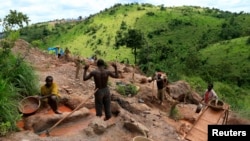In Uganda, the mineral sector is beginning to boom and along with it, contentious issues about land value and fair resettlement packages. Some are warning that these rifts could cause instability. However, the government says it is offering fair reimbursement.
In early October, Uganda's President Yoweri Museveni let out a bombshell. He announced that his cabinet would push to amend the Mineral Act of 2011, instituting government as the legitimate landowner of mineral-rich land.
Currently, section 42 of the act states that all exploration companies must obtain surface rights from landowners before any mineral license is granted.
Museveni wants that changed so investors deal with the government instead of those with land titles. Although the government sometimes intervenes when disputes become litigious, this would change the ownership system all over Uganda.
Don Bwesigye Binyina, the executive director of the Africa Centre for Energy and Mineral Policy, described how poor governmental planning could result in major conflicts.
"You need to engage the communities; you need to sensitize them about what you’re doing, about what mineral resource development is all about, about the benefits. Where do they benefit as a community? Are they getting jobs? What trickledown effect are you having from the industry?"
"It’s not possible for the government personally acquire this land. Because, let’s face it, most wars internationally have been fought over land. …. You’re talking about community-owned land, which these communities have owned for generations and generations," he said.
The revisions to the law are already in the works and could be introduced as early as December. Those inside the Ministry of Energy and Mineral Development think that just because the government owns the minerals, people will still be treated fairly and there’s no reason for disputes to escalate.
"People cannot understand how they can own the land, but the minerals are not theirs. That is a very contentious issue when it comes to mining. In most cases they always reach an agreement. You know always the developers are complaining that either the land owners are overcharging them, or they don’t consider them as people who are coming to develop, John Kennedy Okewing, a mining engineer with the ministry, explained.
"So in that case… what I feel the president was trying to raise up is that he’s going to put up something to help the developer’s access that has the land, which has minerals. So if you’re the land owner maybe government will do something for you... Maybe they will just make the process a light one for the developers."
The government says provisions in all corporate leases require companies to employ and train Ugandans, meaning that communities could benefit from the mineral industry. However, oversight of the companies is limited, and analysts say more provisions must be created to ensure fair land resettlements in the future.




